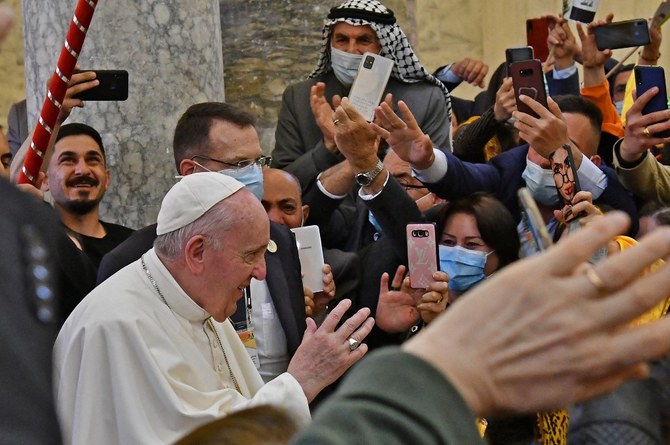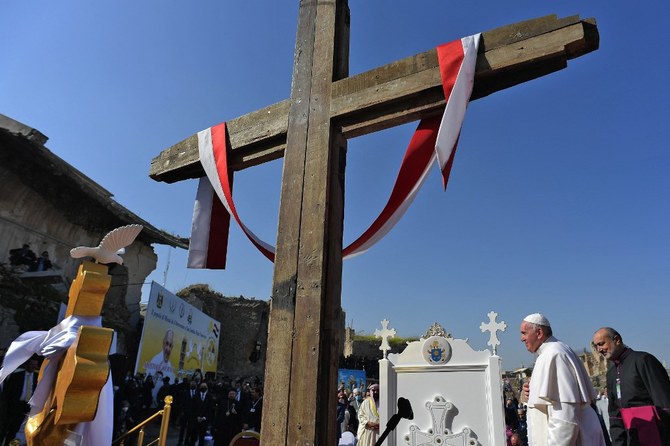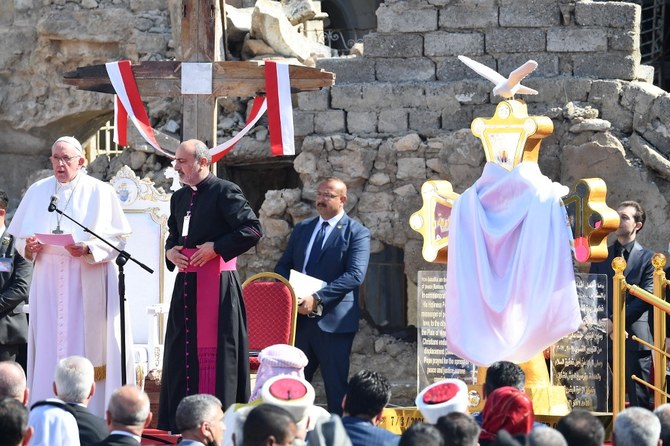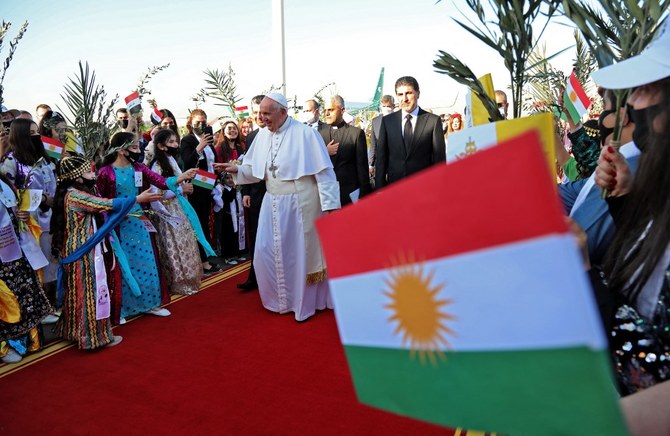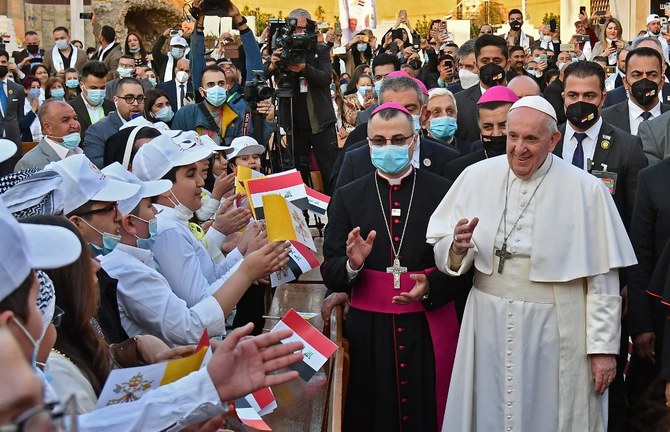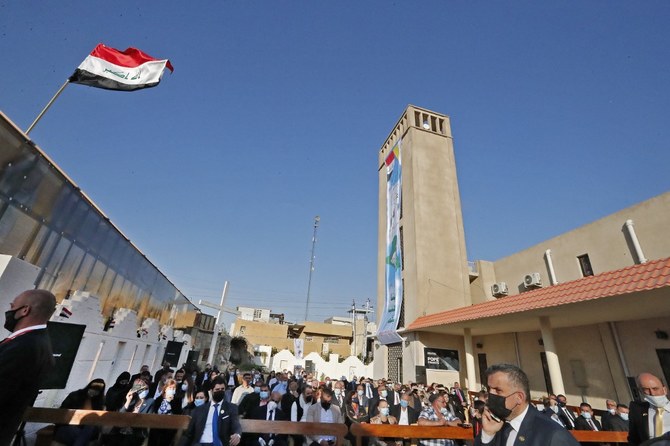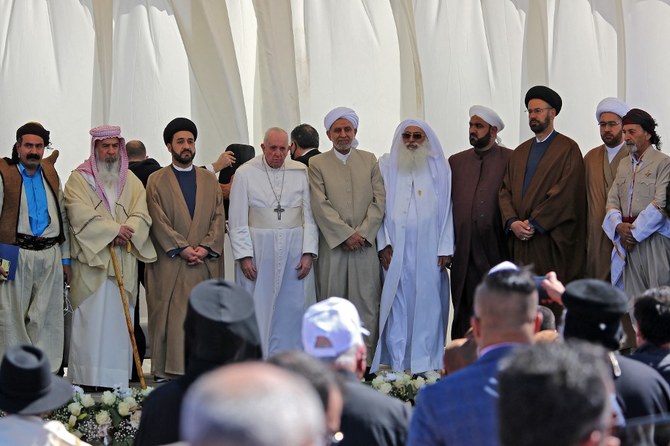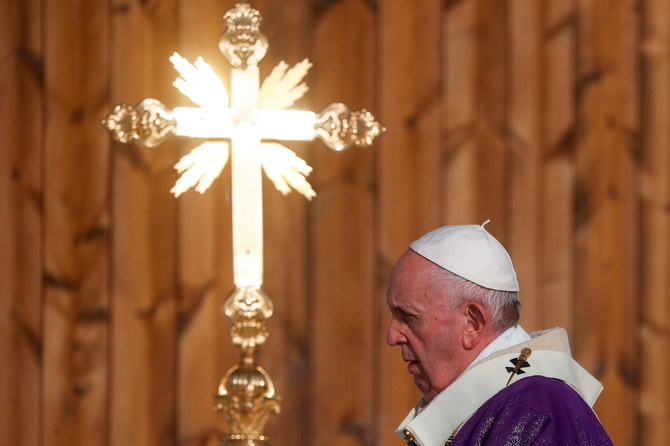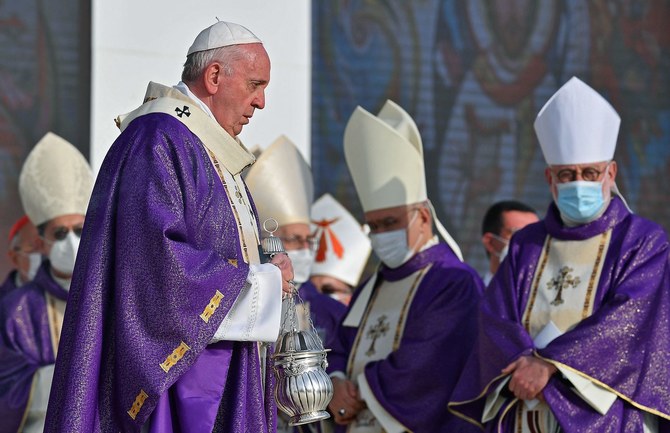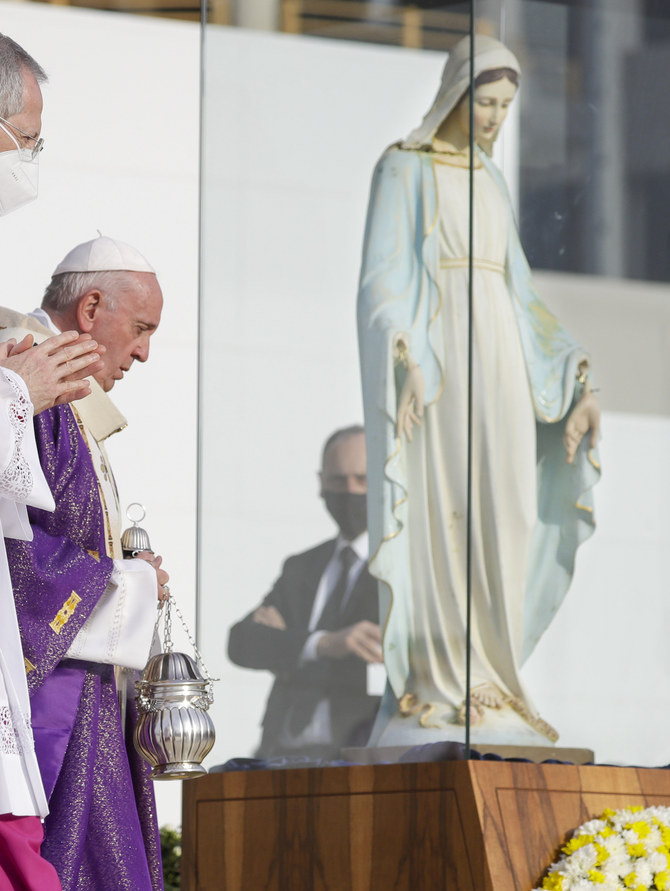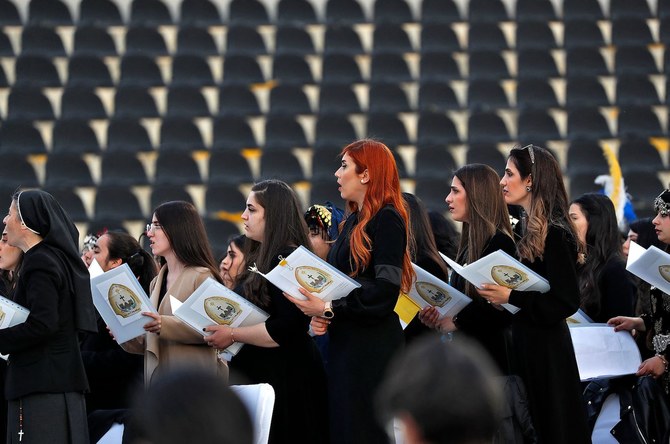DUBAI: Pope Francis vowed Sunday to keep Iraq in his heart, as he concluded the largest mass and final public event of a historic trip meant to encourage the country's dwindling Christian community and deepen interfaith dialogue.
The pontiff celebrated among thousands of smiling worshippers in a sports stadium in the Kurdistan region's capital Erbil, after visiting Christian survivors of Daesh’s reign of terror.
The 84-year-old was driven in his white, windowless "pope-mobile" into the stadium, where jubilant worshippers sat socially distanced on white chairs spread out on the greens.
Others stood, craning their necks to catch a glimpse of Francis, in the stands ringing the Franso Hariri Stadium, named after an Iraqi Christian politician who was assassinated by extremists 20 years ago.
Follow live coverage of his third day itinerary below (All times GMT)

Pope Francis leads a mass at the Franso Hariri Stadium in Erbil, Iraq March 7, 2021. (Reuters)
1516: Pope Francis promised thousands gathered for mass on Sunday in the Kurdish regional capital Erbil, the last public event of his historic trip, that he would keep Iraq in his heart.
"In my time among you, I have heard voices of sorrow and loss, but also voices of hope and consolation," he said.
"Now the time draws near for my return to Rome. Yet Iraq will always remain with me, in my heart."

Pope Francis blesses a statue of the Virgin Mary that was vandalized by Daesh in Karemlash as he celebrates mass in Irbil. (AP)
1345: Pope Francis blesses a statue of the Virgin Mary that was restored after Daesh chopped of the head and hands.
The statue was transported from the church in Keramlis, a Christian village on the Nineveh Plains, to a place of honor on the altar for Sunday’s Mass.
Keramlis, an ancient Assyrian town less than 18 miles (30 kilometers) southeast of Mosul, fell to Daesh in August 2014, two months after the extremists took Mosul and surrounding areas, sending most inhabitants fleeing. In Keramlis, they destroyed the interior of St. Adday church and decapitated the statue of the Madonna.

Pope Francis holds a mass at Franso Hariri Stadium in Erbil, Iraq, March 7, 2021. (Reuters)
1300: Pope Francis celebrated mass on Sunday with several thousand worshippers spread across a stadium in the Kurdistan regional capital of Erbil, the largest liturgy of his trip to pandemic-hit Iraq.
With vaccinations still extremely limited in Iraq and fears the mass could become a super-spreader event, authorities restricted attendance at the Franso Hariri stadium, which usually holds 20,000 people.

Pope Francis walks with an incense censer as he leads mass at the Franso Hariri Stadium in Arbil, on March 7, 2021. (AFP)
1030: Pope Francis’s meeting with the Qaraqosh community ends, and he will be on his way back to Erbil where he will later celebrate Holy Mass at the Franso Hariri stadium before heading to Baghdad.
1008: Pope Francis is urging Iraq’s long-suffering Christians to forgive the injustices committed against them by Muslim extremists and to continue persevering to rebuild the country after years of war and sectarian conflicts.
Speaking to a packed Church of the Immaculate Conception, Francis said “forgiveness” is a key word for Christians. “The road to a full recovery may still be long, but I ask you, please, not to grow discouraged. What is needed is the ability to forgive, but also the courage not to give up.”
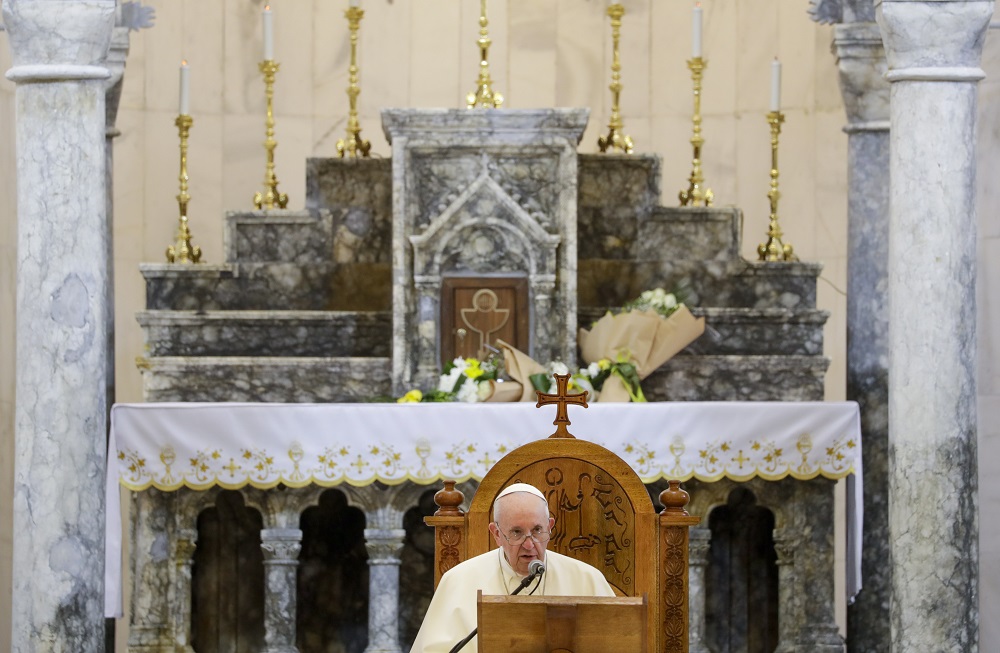
Pope Francis delivers his speech during a meeting with the Qaraqosh community at the Church of the Immaculate Conception. (AP)
0940: Pope Francis meets Christians in an ancient church torched by the Daesh group when it swept into the northern Iraqi town of Qaraqosh in 2014. After the militants were ousted from the town in 2016, the Immaculate Conception Church’s (Al-Tahera) imposing marble floors and columns were restored and the faithful gathered there to welcome the pontiff.
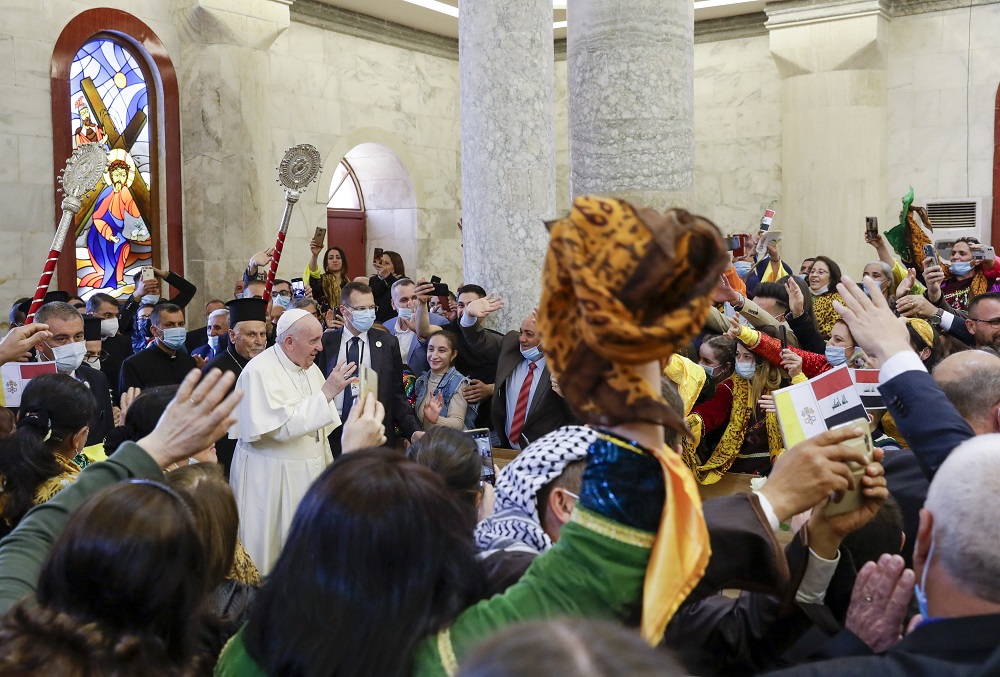
Pope Francis arrives at the Immaculate Conception Church to a warm welcome. (AP)
Watch Pope Francis travel to the Church of the Immaculate Conception in Qaraqosh where he was greeted by the faithful:
0928: Pope Francis receives a rousing welcome as he arrives at the Immaculate Conception Church.
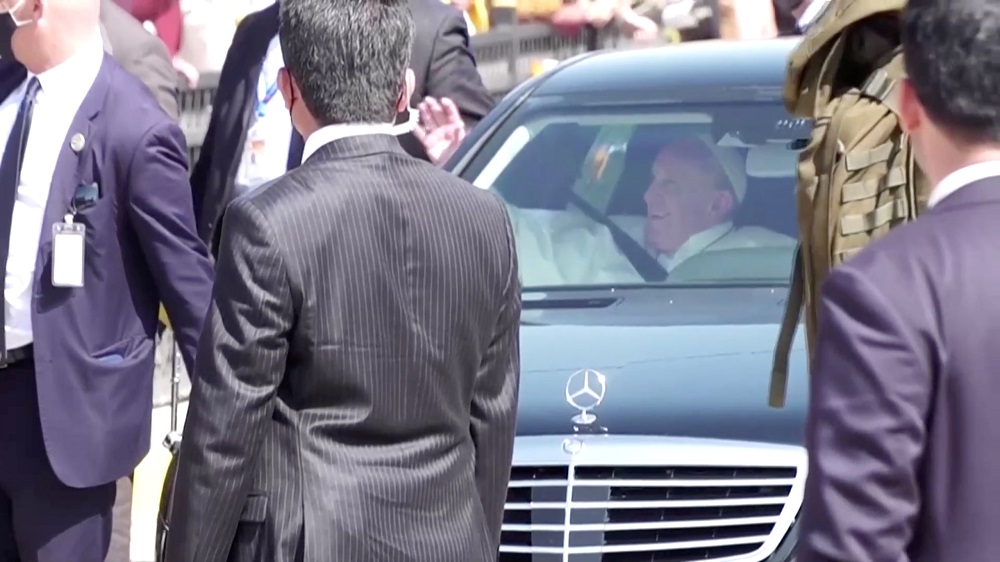
Pope Francis greets faithful as he arrives to hold a mass at the Immaculate Conception Church. (Iraqiya TV/Reuters TV via Reuters)
0910: Pope Francis arrives in Qaraqosh and is enroute to the Immaculate Conception Church.
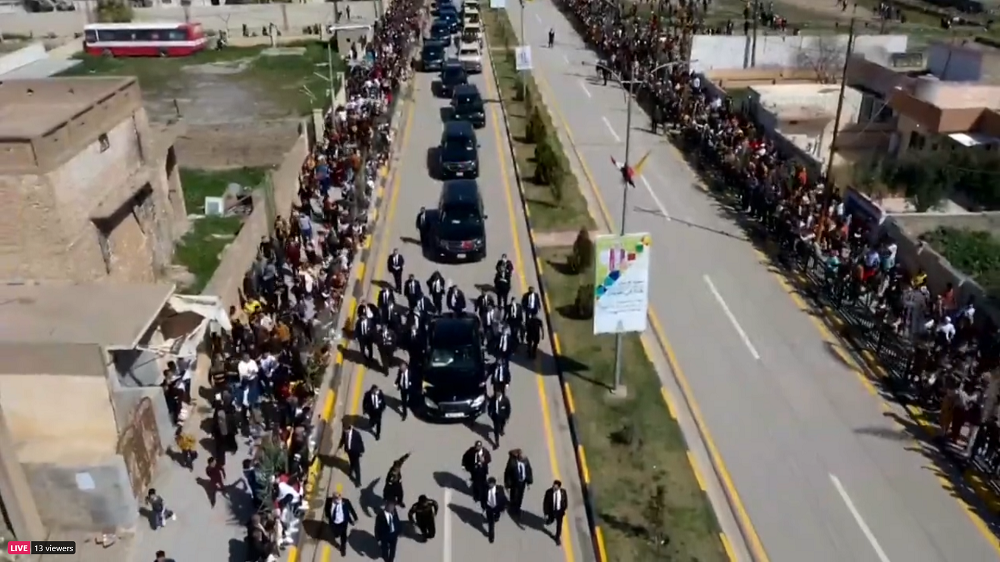
WATCH: Residents of the Iraqi Christian enclave of Qaraqosh wait for the arrival of Pope Francis. Click on Twitter link below.
#LIVE: Pope Francis visits the Immaculate Conception church in Iraq’s small Christian village of Qaraqosh.https://t.co/i6qzxfR6cb https://t.co/9JCuNuyzDn
— Arab News (@arabnews) March 7, 2021
READ: Pope Francis’ visit provides moral support to Christians of Iraq’s Qaraqosh
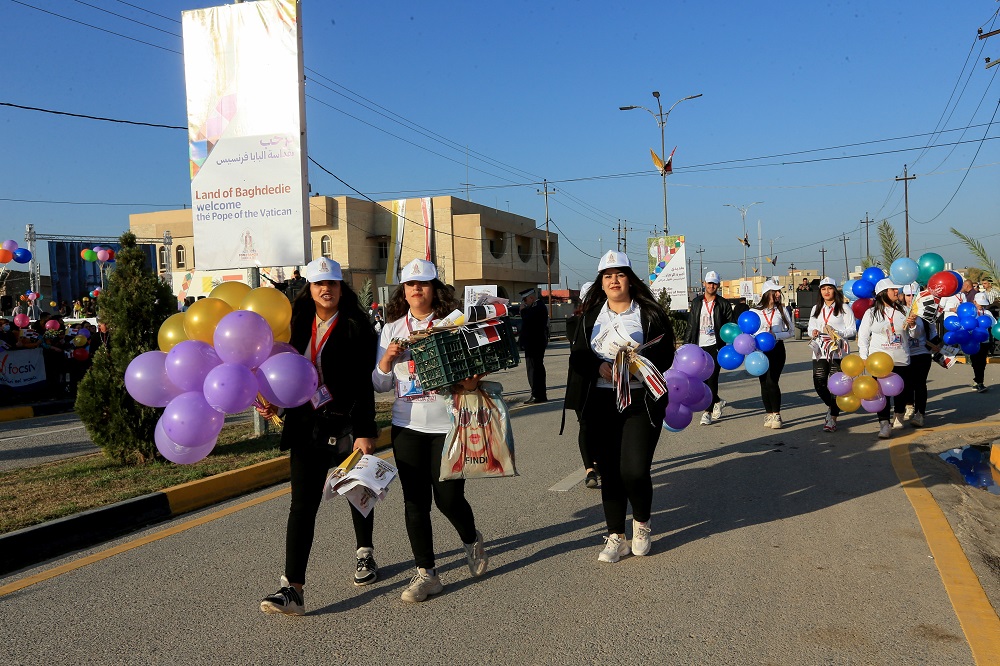
People arrive to attend a mass to be held by Pope Francis near the Grand Immaculate Church in Qaraqosh, northern Iraq. (Reuters)
0804: Pope Francis has left Mosul and is off to the small Christian village of Qaraqosh north of Iraq to visit the Immaculate Conception church.
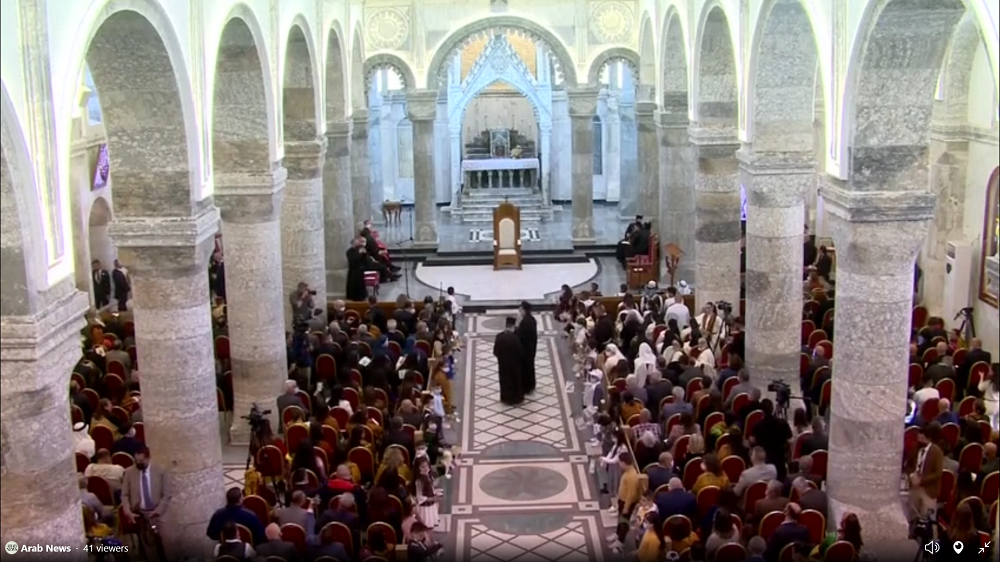
Iraqi Catholics wait for Pope Francis inside the restored Immaculate Conception church. (Screengrab)
0733: Pope Francis prays for “victims of war” outside a centuries-old church in the northern Iraqi city of Mosul, heavily damaged by the Daesh group.
The 84-year-old pontiff said the exodus of Christians from Iraq and the broader Middle East “does incalculable harm not just to the individuals and communities concerned, but also to the society they leave behind.”
“How cruel it is that this country, the cradle of civilization, should have been afflicted by so barbarous a blow, with ancient places of worship destroyed and many thousands of people – Muslims, Christians, Yazidis — who were cruelly annihilated by terrorism — and others forcibly displaced or killed,” Francis said.
The Rev. Raed Kallo, the only priest in Iraq’s second largest city, shared his story among the crowd and before the pontiff. He fled along with most of his congregation of 500 Christian families when Daesh overran the city in June 2014.
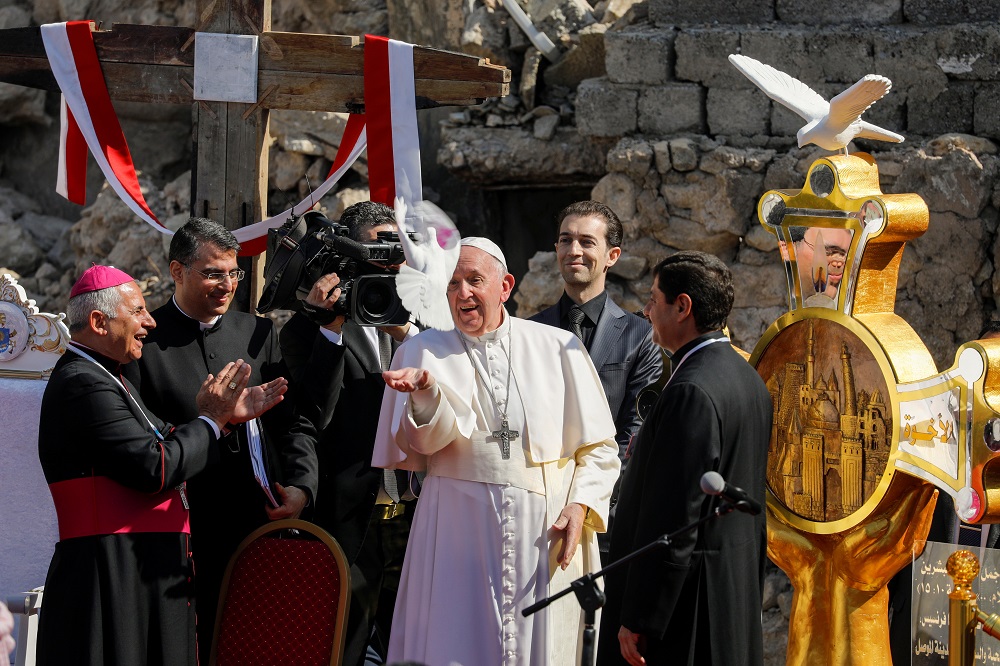
Pope Francis releases a white dove during a prayer for war victims in Mosul. (Reuters)
But he said he returned three years ago, after the extremists were defeated by Iraqi and international forces in a grueling campaign that left much of the city in ruins. He said: “My Muslim brothers received me after the liberation of the city with great hospitality and love.”
But he said only around 70 Christian families reside in Mosul today. The rest are afraid to return and many have emigrated abroad.
Also addressing the crowd was Gutayba Aagha, a Muslim and the head of the Independent Social and Cultural Council for the Families of Mosul. In words welcomed by Francis, he said: “In the name of the council I invite all our Christian brothers to return to this, their city, their properties, and their businesses.”
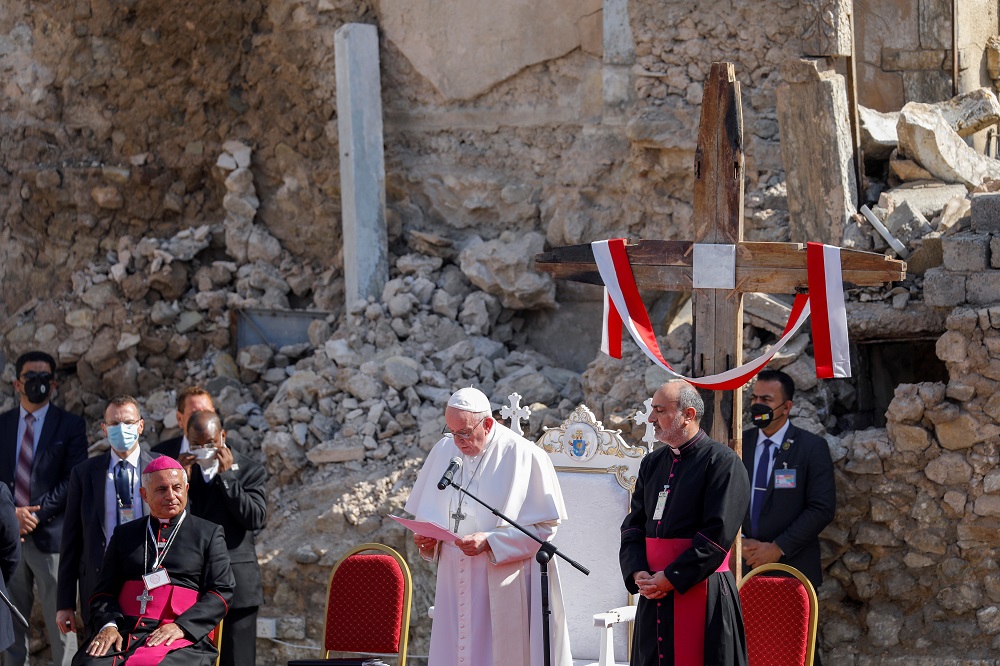
Pope Francis prays for war victims at Hosh Al-Bieaa (Church Square) in Mosul. (Reuters)
0709: Pope Francis is now at the Hosh Al-Bieaa (Church Square) in Mosul, where he will lead a prayer of suffrage for the victims of the war.
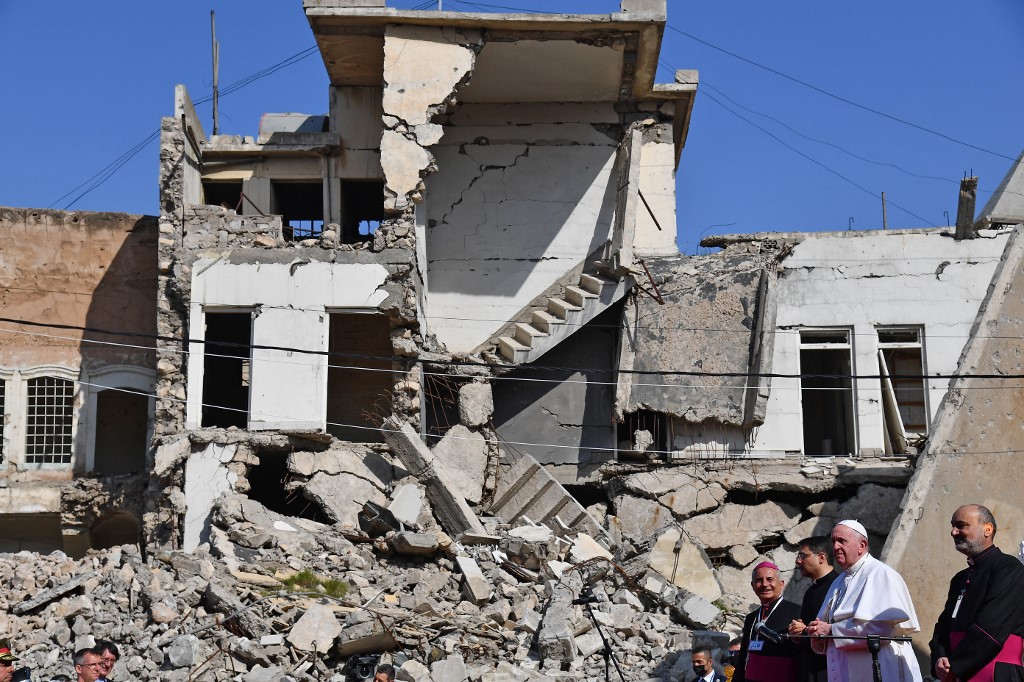
Pope Francis arrives at the ruins of the Syriac Catholic Church of the Immaculate Conception (Al-Tahira-l-Kubra) in Mosul. (AFP)
0655: Pope Francis arrives via helicopter in Mosul, once a stronghold for Daesh and where Christians now number little more than a few dozen families.
MOSUL WAITS FOR POPE FRANCIS
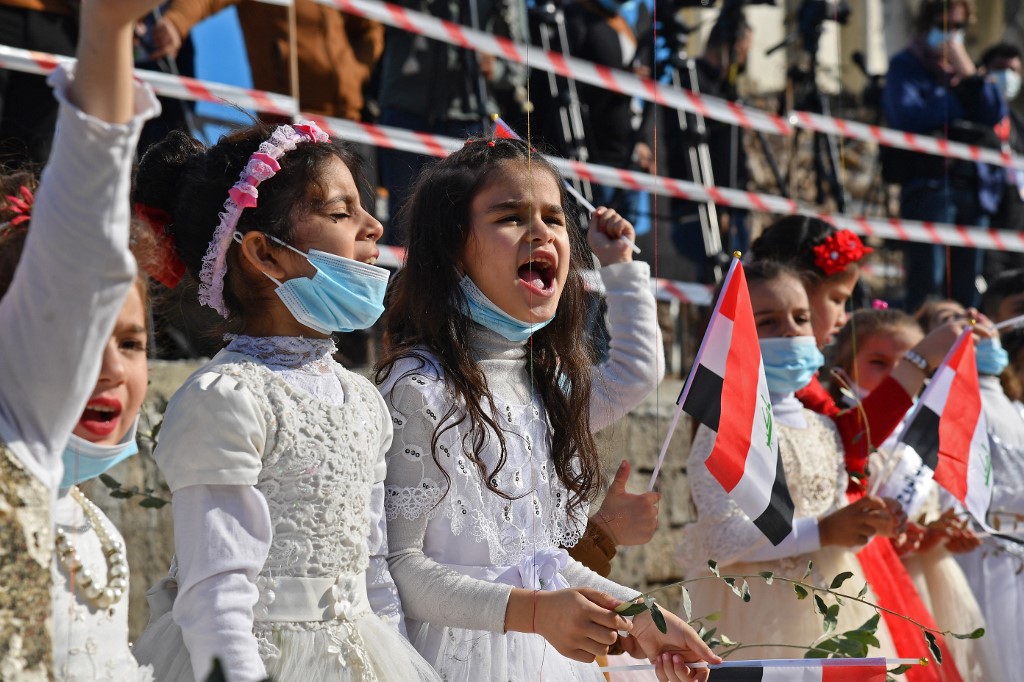
Iraqi children dressed in costumes wave national flags near the ruins of the Syriac Catholic Church of the Immaculate Conception (Al-Tahira-l-Kubra) in Mosul on March 7, 2021. (AFP)
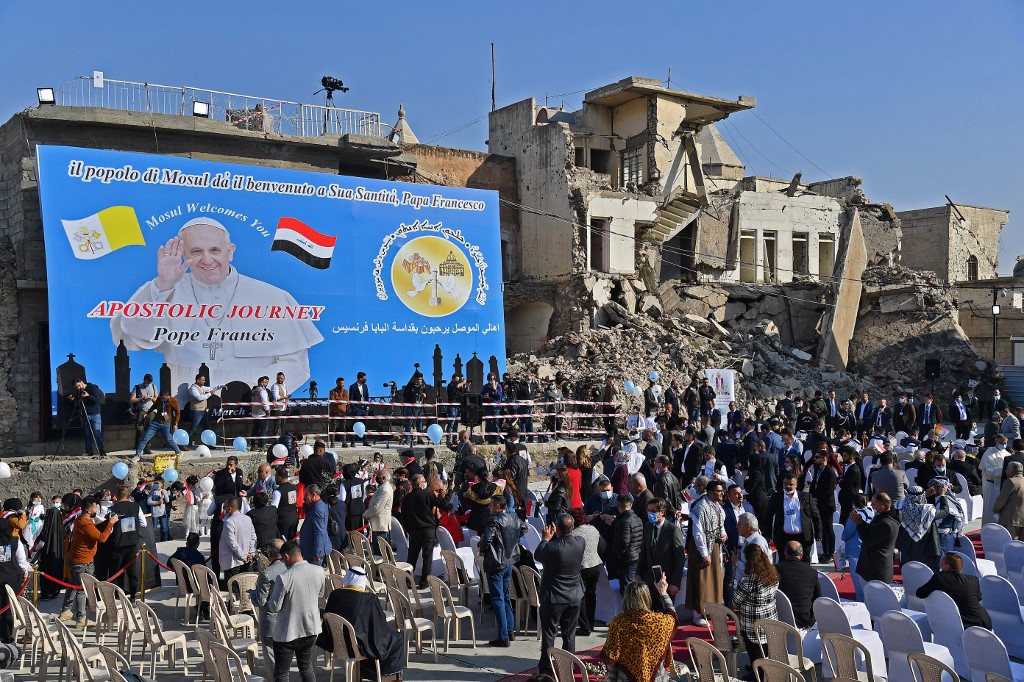
Iraqis gather in the ruins of the Syriac Catholic Church of the Immaculate Conception (Al-Tahira-l-Kubra) in the northern city of Mosul ahead of the Pope Francis’ visit on March 7, 2021. (AFP)
WATCH: Preparations at Hosh Al-Bieaa (Church Square) in Mosul, where Pope Francis will lead a prayer of suffrage for the victims of the war. Click on Twitter link below.
#LIVE: Pope Francis will lead a prayer of suffrage for the victims of the war at Hosh Al-Bieaa (Church Square) in Mosul.https://t.co/i6qzxfR6cb https://t.co/kA5JXWkjpt
— Arab News (@arabnews) March 7, 2021
0523: Pope Francis arrives in Irbil, and is welcomed by Prime Minister Mansour Barzani of the autonomous region of Iraqi Kurdistan and other civil authorities of the region.
READ: Pope Francis’ visit brings Iraqi Kurdistan’s safe-haven status into sharp focus
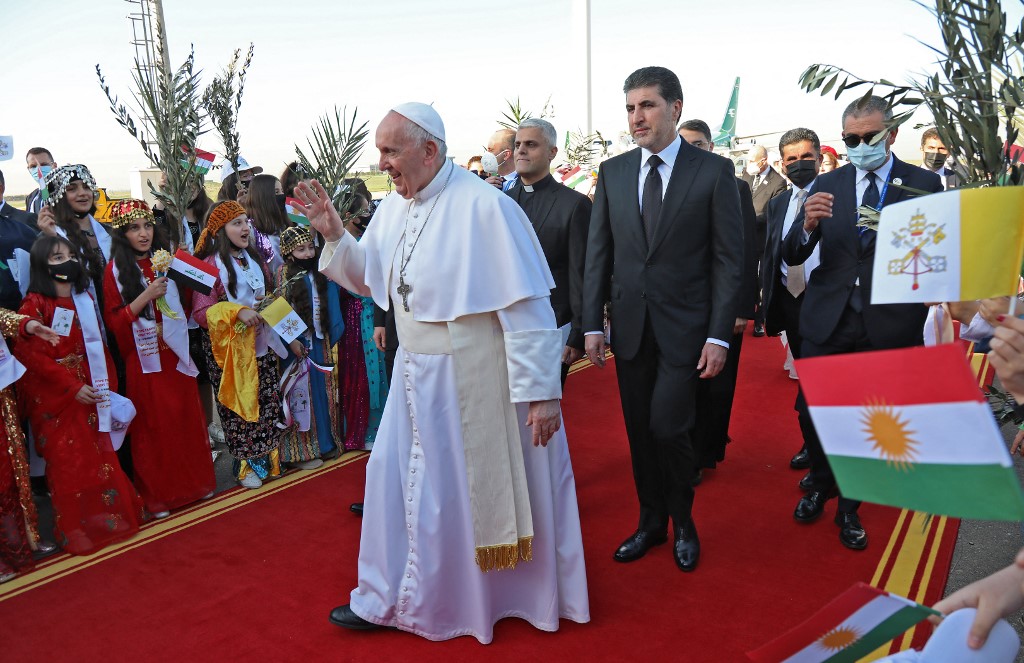
Pope Francis gets a warm welcome from Iraqis dressed in traditional outfits upon his arrival at Irbil airport on March 7, 2021. (AFP)
- with agencies



